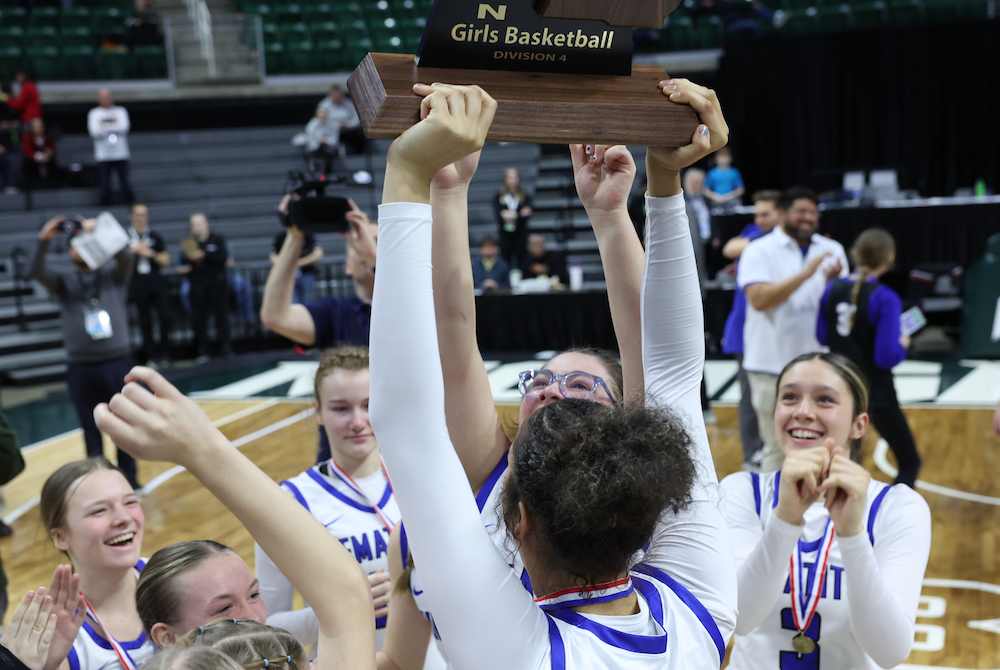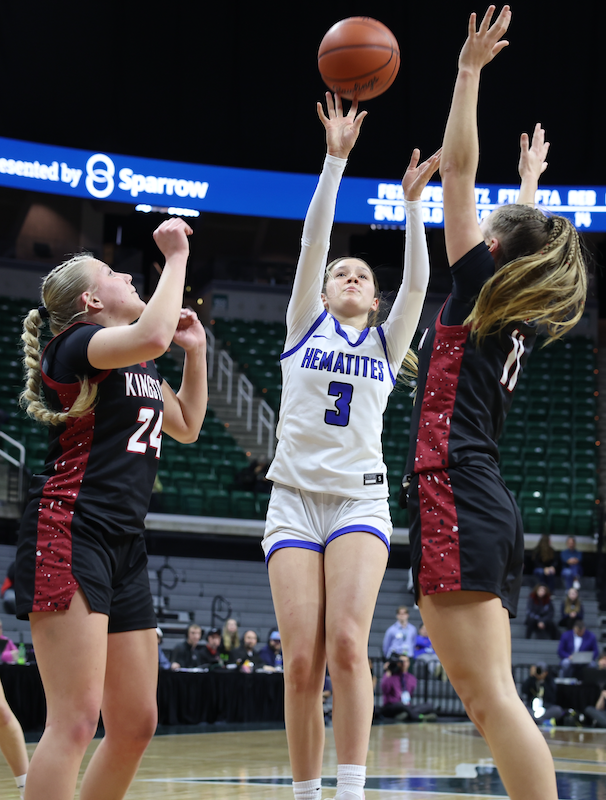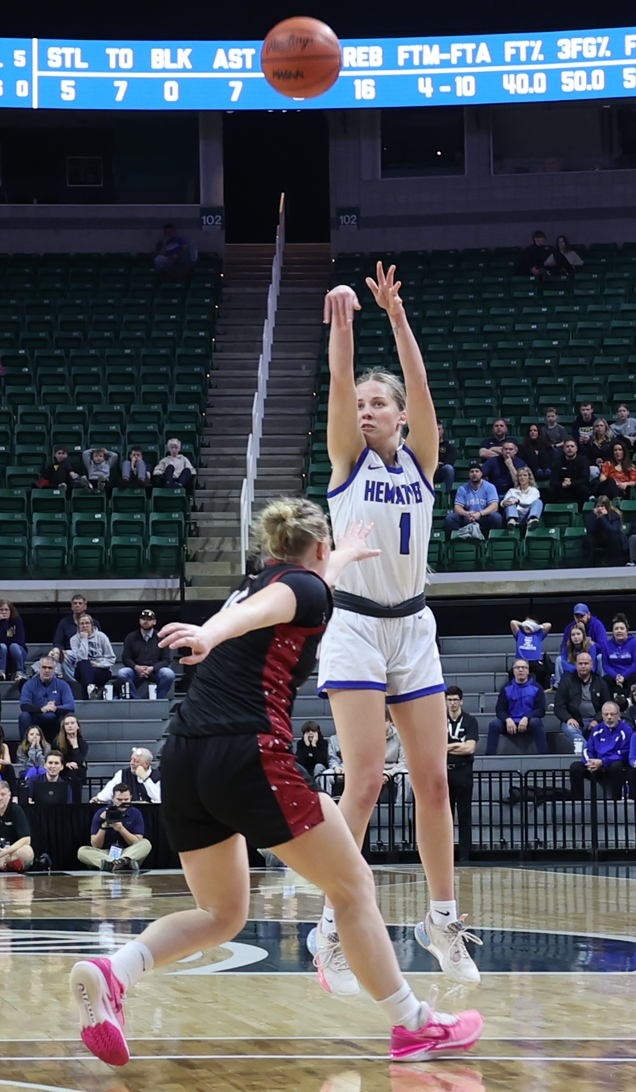
Powerful Voice for High School Sports
December 19, 2014
By Geoff Kimmerly
Second Half editor
Paul Carey was home from the U.S. Army only a few months and just shy of 25 years old when Beal City embarked on its first trip deep into the MHSAA boys basketball tournament.
On the call for local radio station WCEN from gyms at Saginaw Arthur Hill and Lansing Sexton, Carey served as the voice of the previously “laughable” Aggies as they reached the Class D Semifinals before falling just six points short of playing for the title.
“All of Beal City emptied out. They’d never had anything before,” Carey recalled during his annual Thanksgiving weekend visit to the MHSAA Football Finals at Ford Field. “When I got home, within the next two weeks I got a letter from every citizen of Beal City thanking me for broadcasting their games. That’s the kind of appreciation that meant so much.”
During 42 years on the airwaves, Carey was best known as a voice of the Detroit Tigers bounding out of transistor radios all over Michigan, thanks to WJR’s powerful signal.
But for the state’s high school sports community, his legacy is similarly memorable as the voice of the longtime football and basketball scoreboard show and a voter for various all-state teams and wire polls over the decades.
Now 86 and retired since 1991, Carey remains a regular during the first day of the Football Finals, taking in games he broadcast for the MHSAA during the late 1970s and that continue to hold his eye as they have for more than a half-century.
“It was a passion of mine. High school sports always has been,” Carey said. “I think because my dad was a high school coach, and teacher initially, and my brother was a high school coach and teacher, I just grew up in families that appreciated coaching and athletics. I was not a great athlete, but it kept my hand in following sports that way.”
Now, the scores
Carey partnered with Ernie Harwell for Tigers radio broadcasts from 1973-91, including during the march to the 1984 World Series championship. He was named Michigan Sportscaster of the Year six times and to the Michigan Sports Hall of Fame in 1992.
But Carey’s early career included sitting on top of a car, plugged into a phone pole, for a Sacred Heart football game at old Fancher Field just a few blocks from his family’s Mount Pleasant home. Among many more accolades are a Distinguished Service Award from the Michigan High School Coaches Association and a place in the Basketball Coaches Association of Michigan Hall of Fame.
In fact, the start of his weekly announcing of statewide football and basketball scores preceded his baseball career by 16 years and ended two months after he announced his final professional out.
The Michigan High School Scoreboard show was a staple of WJR’s late Friday nights from 1957-91. Carey would read every score he could collect from a variety of sources, often organized by league and with state rankings and context mixed in.
His idea came from something similar read by Len Colby for Kalamazoo’s WKZO. Carey’s brother Terry was coaching at Niles during the second half of the 1950s, and he and other coaches would get together to listen to the Friday night scores from the southwestern part of the state.
Carey, who left WKNX in Saginaw for WJR in 1956, explained to then-sports director Bob Reynolds that the station’s strong signal could provide for a truly statewide scoreboard experience.
Carey then connected with Edgar Hayes of the former Detroit Times, who gave the OK for Carey to call the paper on Friday nights to get scores from the Detroit metro area. For the rest, Carey relied on wire services – there were three at the time – who relied on newspapers from all over Michigan to call in scores over the course of an evening.
Before every Friday during high school football season – and later Tuesdays and Fridays during boys basketball season – Carey typed up lists of games based on schedules in the newspaper, with spaces to add scores. More than a few times, Carey raced down a back ramp at Tiger Stadium after a Friday night game, back to the WJR studio, with 15 minutes to prep for the show’s 11:30 p.m. start.
“If the Flint Journal, the Grand Rapids Press, the Traverse City paper didn’t call in scores to the AP, then I was out of luck too. And that happened all the time,” Carey said. “I would call back occasionally, say, ‘Did you get anything more?’ It was a rat race.”
The show originally was set for 10 minutes and then extended to 15. American Airlines sponsored a record show that followed, and Carey’s scoreboard show had a sponsor only once in 35 years. Finishing up on time was expected, even with more than 200 scores to read.
But Carey said he always went 20 minutes, sometimes 25.
“Because I wasn’t done. I just kept right on going,” Carey said. “Jay Roberts did the all-night show most of the time, and he was patient with me. He didn’t say too much on the air about ‘that guy ahead of me took all of my time.’”
Carey continued the “rat race” until his final scoreboard show, Dec. 20, 1991. He retired from WJR at the end of that calendar year. And it's important to note: Carey was never paid a dime extra for doing the program. .
“I think Paul is really just a sports fan, and that came across to the listener on his broadcasts,” MHSAA historian Ron Pesch said. “Paul would gather as much as possible off the wire. He'd interject if scores were missing from sections of the state. Press polls from the Free Press, News, AP and UPI were big, so he could point out close calls and upsets.
“He provided immediacy, or the closest thing to it in the days before cable TV and the Internet, and because of his scoreboard show, you could get the results before the morning paper. For listeners, he brought life to something as simple as game scores.”
First team all the way
Carey, who resides in Rochester, also served as the engineer on Tigers broadcasts for 16 years, through 1990. He broadcast Pistons games on the radio for six seasons and did the first broadcast of a Central Michigan University football game, in 1949.
Harry Atkins, covering Detroit’s teams while with The Associated Press for 29 years including the last 21 as its sports editor for Detroit, took note of his colleague's hard work – and especially that Carey was one of few broadcasters who was a journalist in addition to a voice.
That made Carey's other major role in high school sports a natural fit.
Atkins split The Associated Press all-state selection panels for football and basketball into 11 regions, and Carey represented the Detroit area for a number of years. He also was a longtime voter in those sports' weekly polls.
“Paul is just that kind of guy. He thought it was important and he made time in his busy schedule to do it,” Atkins said “And it had an impact on the other 10 voters on the All-State panels, too.
“Some of them were from small out-state newspapers or radio or TV stations. Yet every one of them knew who Paul Carey was. And when he spoke, of course, with what often is called "The Voice of God," those voters paid attention.”
And he still does, as well.
At the end of each fall, Carey still puts together a compilation of the three high school all-state football teams – Associated Press, Detroit Free Press and Detroit News – and files them with years of research and results.
“It’s important to me. Nobody sees it but me, but I get a certain kick,” Carey said. “Once in a while I’ll see a kid playing at Central, Western or (Michigan) State or Michigan, and they’ll say he came from Clawson. I’ll go into my all-state collections, say that would’ve been 2009 he played, and I find a name.”
In addition to the Football Finals on WJR, Carey was part of the Baseball Finals broadcasts into the early 1990s, continuing to contribute even after his retirement from his fulltime gig.
He spent high school games over the years sitting next to legends like the Free Press’ Hal Schram and remembers when current Free Press longtime scribe Mick McCabe was just a rookie. One of Carey's final broadcasts was a 1992 Baseball Final with his nephew Mike Carey, who continues to broadcast MHSAA championship games to this day.
“I am eternally grateful to Paul Carey. His contribution to high school sports in Michigan has been great and significant,” Atkins said.
“We are lucky to have him.”
PHOTO: Paul Carey (left) and nephew Mike Carey broadcast the MHSAA 1992 Class D Baseball Final between Hillman and Athens for PASS.

Eagle Provides Decisive Lift as Ishpeming Lands 1st Finals Championship
By
Keith Dunlap
Special for MHSAA.com
March 23, 2024
EAST LANSING — This gave new definition to soaring to new heights on the wings of an eagle.
Through the first 15 minutes of Saturday’s Division 4 championship game against Kingston, Ishpeming sophomore and leading scorer Jenessa Eagle had just two points.
From that point on, nobody on the floor flew higher.
Eagle scored 25 points over the final two quarters plus a minute of the second, finishing with a game-high 27 points to help lead Ishpeming to its first Finals title with a 73-54 win over a Kingston team that also was playing in its first championship game.
“I was really getting into wanting to win,” Eagle said. “I was wanting to do it for my team. I wasn’t really thinking that much. I was just going out and doing what I practiced.”
 Ishpeming became the first girls basketball team from the Upper Peninsula to win a Finals championship since Calumet and St. Ignace did so in 2015.
Ishpeming became the first girls basketball team from the Upper Peninsula to win a Finals championship since Calumet and St. Ignace did so in 2015.
Despite what the final score said, Ishpeming had to navigate some first-half adversity.
Kingston used a 16-2 run late in the first quarter to take a 22-11 lead going into the second. A critical juncture came with 2:34 remaining in the second quarter, when Ishpeming senior Jenna Maki had to leave the game with her third foul.
Kingston held a 26-21 lead at that point, with Maki having scored 16 of the Hematites’ points. But Ishpeming rallied with Maki on the bench, outscoring Kingston 10-4 the rest of the quarter to take a 31-30 lead into halftime.
Eagle and senior Kaitlyn Van Deuren each sank 3-pointers to start the rally, and then Eagle and senior Payton Manninen both added 2-point baskets for the Hematites.
“We have a very trusted bench,” Ishpeming head coach Ryan Reichel said. “Our girls all come in knowing that they have a role where they can compete and do some big things for us. Even when Jenna was out, we knew we had girls who could still put the ball in the basket.”
Ishpeming continued that momentum during the third quarter, forcing six turnovers over the first 1:39 of the frame to build a 39-30 lead. Eagle then caught fire from the outside, draining a couple of deep 3-pointers to give Ishpeming a 47-34 lead with 3:35 to go in the period.
 Ishpeming ultimately took a 58-46 lead into the fourth quarter, with Eagle scoring 15 of the team’s 27 points during the third. The Hematites kept up the pressure from there, going on a 10-0 run to take a 73-50 lead with 3:21 remaining and essentially start the celebration.
Ishpeming ultimately took a 58-46 lead into the fourth quarter, with Eagle scoring 15 of the team’s 27 points during the third. The Hematites kept up the pressure from there, going on a 10-0 run to take a 73-50 lead with 3:21 remaining and essentially start the celebration.
Maki, the school’s all-time leading scorer, finished a terrific career by adding 24 points to her total and pulling down eight rebounds. She and the rest of Ishpeming’s seniors fulfilled an ambition they have had since they started playing together in kindergarten.
The Hematites won just five games four seasons ago, but skyrocketed quickly and are now on top of the state.
“It really does feel great,” Maki said. “Just like this experience, it feels surreal right now. It’s amazing to see all the fans and all our community who made it down here. It’s a great feeling.”
Senior Abbey Walker had 14 points and 10 rebounds and sophomore Molly Walker scored 14 points for Kingston, which finished a historic season of its own at 27-2.
“This was a great day for Kingston girls basketball,“ Kingston head coach Jay Green said. “There was a huge crowd here supporting us, and we played an outstanding team. The girls gave it all they got. I told their coach after the game that they can make the final four in Division 1, 2, 3 or 4. That team is outstanding. Everybody knows that.”
PHOTOS (Top) Ishpeming players raise their championship trophy Saturday at Breslin Center. (Middle) The Hematites’ Jenessa Eagle gets up a shot with Kingston’s Keria McGarvie (24) and Molly Walker defending. (Below) Jenna Maki (1) launches a 3-point attempt. (Photos by Hockey Weekly Action Photos.)

